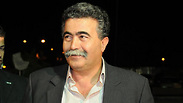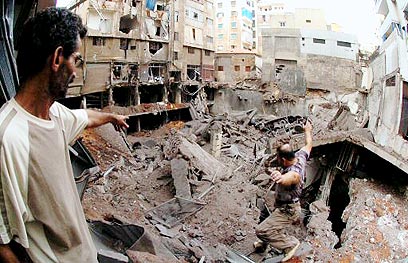
How Israel created deterrence in the Second Lebanon War
Op-ed: Two significant moves – impairing Hezbollah's rocket launching ability and destroying its headquarters in Beirut's Dahiya Quarter – were essential components in the restoration and intensification of the Israeli deterrence in 2006; attacking state infrastructures would have strengthened this deterrence even more.
Indeed, the years that have passed since then have proved that Israel has a strong and ongoing deterrence vis-à-vis Hezbollah.
Since 2006, Hezbollah has armed itself with long-range missiles with heavy warheads, but its leadership is choosing to avoid using them, although it has good reasons – as far as the organization is concerned – to hurt Israel (Imad Mughniyeh's fate and the weapon convoy attacks are the obvious ones), compared to the decade which preceded the Second Lebanon War, during which it didn't hesitate to kidnap Israelis, snipe, plant explosive devices and launch rockets.
Essential components in the restoration and intensification of the deterrence were two significant moves carried out during the Second Lebanon War: Damaging the strategic ability to launch long-range rockets and missiles at Israel, and destroying Hezbollah's control and security center in Beirut's Dahiya Quarter.

Nonetheless, further action – attacking the Lebanese state's infrastructure, had it been executed – would have undoubtedly strengthened the Israeli deterrence and might have even shortened the war. Attacking infrastructures, while insisting on the principle of "the state's responsibility," is at the basis of Israel's security perception. In 2006, the political echelon chose not to do so due to the consideration that harming the then-pro-Western Lebanese government would have lessened the international support, and therefore also the freedom of action against Hezbollah.
Journalist Raviv Drucker's program "Hamakor" on the Second Lebanon War, which was broadcast recently on Channel 10, exposed the built-in tension between the military and political echelon, which is represented in this equation by the defense minister. In this case, Amir Peretz found himself at a decisive decision making junction in the midst of a difficult and complicated military battle, only two months after taking office.
Immediately after the abduction of IDF soldiers Eldad Regev and Ehud Goldwasser, the General Staff convened to prepare operative suggestions for the political echelon, focusing on the suggestion to massively damage state infrastructures in Lebanon, including power stations in Beirut. A second alternative was to attack the Fajr arsenal – the long-range rockets located inside homes in southern Lebanon villages. It was clear that such an operation would lead to a large number of civilian casualties and could expose sensitive intelligence sources.
In a preliminary General Staff discussion, the chief of staff concluded that it would be preferable to attack infrastructures, which would lead to a relatively low number of civilian casualties.
From the chief of staff's office we moved on to the defense minister's office. We met an open-minded, attentive minister, who asked the right questions, set appropriate targets and ignored "background noises." To the surprise of many of the discussion's participants, Peretz did not accept the proposal to attack the infrastructures in Lebanon, but demanded action against the Fajrs – targeting some 60 launchers located in private homes, often in children's rooms.
"I am a humane person," Peretz said, "but whoever lives with a missile in his home should not be surprised when he wakes up without a home." This decision conveyed a clear message to terror organizations in general, and to Hezbollah in particular, that the strategy of cynically using the civilian population as "human shields" for their weapons will not succeed. In this decision, the defense minister changed the IDF's thought process.
It was an important example of the political echelon's precedence over the military echelon and its right to decide on a way of action in a completely different manner from the army's recommendation. A similar move, vis-à-vis the portable long-range missile arsenal in Beirut, completed the enemy's understanding that Israel would not hesitate to defend its citizens even if missiles and rockets were placed in civilian areas. Later on, Hezbollah's control centers and headquarters in the Dahiya were also attacked. It was not a trivial attack, and some of the political echelon's ministers were against it.
Nonetheless, I doubt that sticking to the decision to avoid attacking state infrastructures was right. As previously said, such an attack could have dramatically shortened the war. In any event, the argument against it – the need to avoid harming a pro-Western government in Lebanon – is no longer valid. Hezbollah is today a full partner in the Lebanese government, and Israel must go back to the principle it set in the 1950s and 1960s: Casting state responsibility on a country from which the enemy operates against Israel.
Major-General (res.) Amos Yadlin is the director of Tel Aviv University’s Institute for National Security Studies (INSS) and served as head of the IDF's Military Intelligence Directorate.










